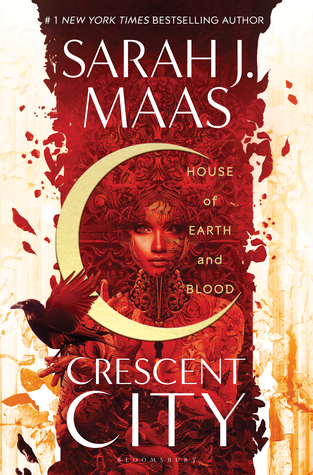 House of Earth and Blood (Crescent City, #1) by Sarah J. Maas
House of Earth and Blood (Crescent City, #1) by Sarah J. Maas Format: audiobook, ebook
Source: purchased from Amazon, purchased from Audible
Formats available: hardcover, paperback, ebook, audiobook
Genres: epic fantasy, fantasy, fantasy romance, paranormal, science fiction, urban fantasy
Series: Crescent City #1
Pages: 803
Published by Bloomsbury Publishing on March 3, 2020
Purchasing Info: Author's Website, Publisher's Website, Amazon, Barnes & Noble, Kobo, Bookshop.org
Goodreads
Bound by blood.Tempted by desire.Unleashed by destiny.
Bryce Quinlan had the perfect life—working hard all day and partying all night—until a demon murdered her closest friends, leaving her bereft, wounded, and alone. When the accused is behind bars but the crimes start up again, Bryce finds herself at the heart of the investigation. She’ll do whatever it takes to avenge their deaths.
Hunt Athalar is a notorious Fallen angel, now enslaved to the Archangels he once attempted to overthrow. His brutal skills and incredible strength have been set to one purpose—to assassinate his boss’s enemies, no questions asked. But with a demon wreaking havoc in the city, he’s offered an irresistible deal: help Bryce find the murderer, and his freedom will be within reach.
As Bryce and Hunt dig deep into Crescent City’s underbelly, they discover a dark power that threatens everything and everyone they hold dear, and they find, in each other, a blazing passion—one that could set them both free, if they’d only let it.
With unforgettable characters, sizzling romance, and page-turning suspense, this richly inventive new fantasy series by #1 New York Times bestselling author Sarah J. Maas delves into the heartache of loss, the price of freedom—and the power of love.
My Review:
In the beginning there is Bryce Quinlan and Danika Fendyr. And in the end, there is Bryce Quinlan and Danika Fendyr, linked together by their hearts and the translation of a tattoo on both of their backs, “Through love, all is possible.”
That’s the way it begins, and that’s the way it ends. In between, there’s a long walk through very dark places that Bryce is forced to take alone. Or so she thinks. Or so it seems.
Ultimately, House of Earth and Blood is a story about love. Not just romantic love, although there is a slow-burn romance at the heart of this story. But the romance at the true soul of this saga is not Eros, as the Ancient Greeks called sexual passion, but rather the deep friendship of the soul that they named Philia.
What seems like a star-crossed romance between the half-human, half-fae and barely magical Bryce Quinlan and the fallen angel Hunt Athalar is the stuff of which Romeo and Juliet tragedies are made. The deepening angst of their enemies into lovers story gives this saga both its biting wit and its too-frequent descents into over-the-top melodrama.
But it’s Bryce and Danika’s sisters-of-choice, bone-deep connection that gives this story its lowest depths of despair – and its wings.
Once upon a time, when my parents were still among the living and we used to play cards together, at the end of hand someone would frequently say, “Read ‘em and weep.” In a nutshell, that’s House of Earth and Blood.
Read it and weep.
Escape Rating B-: There were points during my reading/listening of this book that I just couldn’t stand not knowing what came next so I dove from the audio right into the ebook the minute I got home.
And there were times when I was ready to throw the thing against the wall and end the torture because there were so many things that just drove me crazy. That I was considering this course of behavior in the car, listening to my iPhone while I was driving shows just how tempted I was.
So I’m not remotely neutral about any of this. Not at all.
The short version of this review is that the first 100 pages were terrific and ended in a gut wrenching drop. The last 100 pages were so damn compelling that I couldn’t wait to finish in audio THEN couldn’t flip pages fast enough.
Much of that final 100 page compulsion was provided by a clichéd villain exposition to make the heroine see just how brilliant his villainy had been, but the reader – and every other character in the story – needed to hear it. But villain clichés are still villain clichés.
In the middle there were 600 pages that would have been better as 400 or 450 pages. A metric fuckton of stuff happened, a lot of it was stuff the reader really, really needed to know. But there was also an equally metric fuckton of over-the-top angst that may have needed to happen but didn’t need to happen with that many repeats or nearly that much overblown language and description.
My feelings about this book are absolutely in the category of splinters up the ass fence sitting. The parts I loved, I really, really loved. The parts that I hated, I hated just about as much. There’s no middle ground here that isn’t a quagmire of blood, sweat, tears and angst.
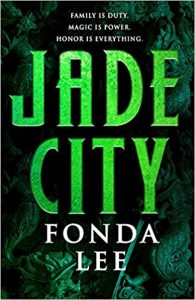 Initially, what dragged me into this story was the sheer complexity of the worldbuilding. This is not a place I’d EVER want to live, because it is seriously fucked up – especially for the original recipe humans – but the mixture of 21st century technology with high-powered magic and authoritarian rule by powerful immortals blends into a world that is both easy to envision and fascinating to explore.
Initially, what dragged me into this story was the sheer complexity of the worldbuilding. This is not a place I’d EVER want to live, because it is seriously fucked up – especially for the original recipe humans – but the mixture of 21st century technology with high-powered magic and authoritarian rule by powerful immortals blends into a world that is both easy to envision and fascinating to explore.
The vibe of Crescent City and its world feels very much like the heady aura of the organized menace of power and magic that permeates Fonda Lee’s marvelous Jade City, the first book in her Green Bone Saga.
As much as the way this world works reminded me of Jade City, in the end it read like a whole bunch of recent SF/Fantasy worlds thrown into a gigantic blender set on high. The resulting mélange is generally pretty tasty, and I found the depth of the worldbuilding to be the strongest part of the book.
Especially considering that, as much as this reads like an urban fantasy in a high fantasy setting for much of the story – rather like the Chronicles of Elantra by Michelle Sagara (start with Cast in Shadow), technically this is science fiction of the “walks like a duck, quacks like a duck, but isn’t a duck,” variety. Like A Chorus of Dragons by Jenn Lyons, where it turns out that the gods aren’t really gods, but rather immortals who came from another planet. Although Lyons sends the world of her series careening off its tracks in an entirely different way. Still, if you like The House of Earth and Blood and can’t wait for the next book, check out The Ruin of Kings.
As much as I loved the beginning of this book, and found the ending to be utterly riveting, the middle sagged and bagged.
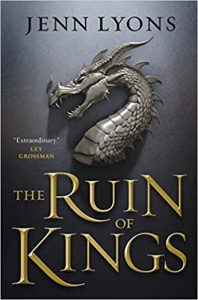 Some of that was language. It felt like all of the physical descriptions of people were repeated whenever they appeared, over and over and over. And it was very obvious that all of the people in this story were all extremely conventionally attractive. But all of the descriptions were overblown, something that was particularly obvious in audio.
Some of that was language. It felt like all of the physical descriptions of people were repeated whenever they appeared, over and over and over. And it was very obvious that all of the people in this story were all extremely conventionally attractive. But all of the descriptions were overblown, something that was particularly obvious in audio.
There was also a lot of wordy, emo, angsty, over-the-top emotionalism, particularly on Bryce’s part that I found teeth-gnashing. It made it very clear that she still had a tremendous amount of growing up to do, to the point of really making me wonder about the developing relationship between Bryce and Athalar with its 200 year age gap.
But the entire middle section felt like it had three purposes. Build that romantic relationship – only to cockblock it at every turn, watch Bryce get beaten down and run around at every single turn, and follow Bryce and Athalar as they conduct an investigation that is doomed to fail because there’s a villain they don’t know about hiding behind the metaphorical curtain. Leading right back to that clichéd villain exposition.
All of those things needed to happen, but the runaround was long and repetitive. It also drove home that this is a “power corrupts and absolute power corrupts absolutely” story, as it seems that every single system and authority is determined to remind Bryce that she is the lowest of the low – and so is nearly everyone else.
There was a hateful sameness to all of the powerful people in this story. While power does corrupt, it doesn’t necessarily corrupt every villain with exactly the same blend of total inability to see anyone else – even their own families – as having any value whatsoever AND utter sadism. Some powerful people would be savvy enough to at least hide their ugly a bit better and at least a few would manage to be slightly enlightened even if that enlightenment is because it’s ultimately in their own self interest to at least seem benevolent.
And we don’t know why they are ALL this way. Villains never think they are the villain, after all. So what’s their story? The sheer number of times that one of the many, many villains reveled in their ability to mentally and/or physically torture others was initially sickening and then it just got old.
Before this review – or rant – goes on as long as the book it covers, one final thought. I loved, and hated, and loved this book by turns. But I never stopped thinking about it – even when I wanted to. It’s compelling when it’s good and it’s compelling when it’s crazy.
But it ended on an incredible high note, to the point where, as much as it drove me round the twist, I know that I’ll be compelled to pick up the second book in the series when it comes out (hopefully) next year. I’m pretty sure this is going to be a story where things get darkest just before they turn completely black – BUT I HAVE TO KNOW!

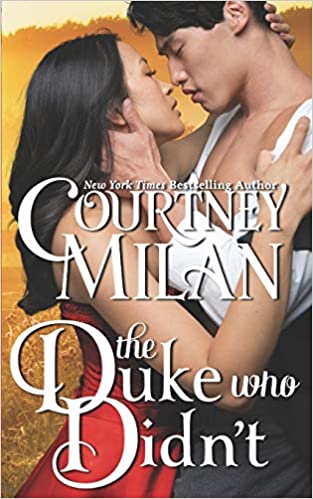 The Duke Who Didn't by
The Duke Who Didn't by 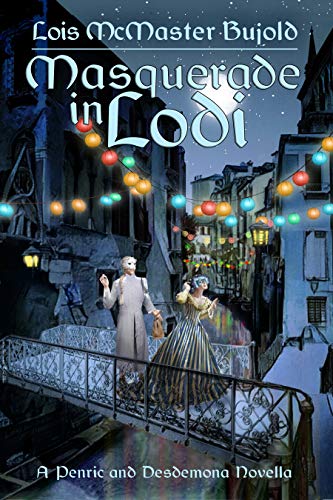 Masquerade in Lodi (Penric and Desdemona #4) by
Masquerade in Lodi (Penric and Desdemona #4) by 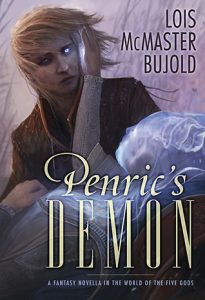 Penric, whose adventures have featured in this novella series since its beginning in
Penric, whose adventures have featured in this novella series since its beginning in  The series began when Desdemona jumped from her previous host, the dying Learned Divine Ruschia, to young Penric, knocking his life into another channel from the one he was expected to have as the younger son of a prosperous landowner.
The series began when Desdemona jumped from her previous host, the dying Learned Divine Ruschia, to young Penric, knocking his life into another channel from the one he was expected to have as the younger son of a prosperous landowner.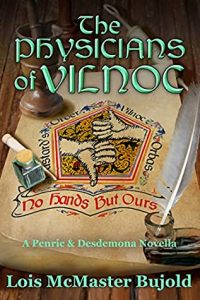 Those events are still in Penric’s future in Lodi, and it takes a bit of a reset to get one’s reading self back on track. A worthwhile mental adjustment, but definitely an adjustment. The book whose events immediately precede this one is
Those events are still in Penric’s future in Lodi, and it takes a bit of a reset to get one’s reading self back on track. A worthwhile mental adjustment, but definitely an adjustment. The book whose events immediately precede this one is  At the Slightest Sound (ShadowForce: Psi #1) by
At the Slightest Sound (ShadowForce: Psi #1) by  I read the first three books in the
I read the first three books in the  Escape Rating A-: This was definitely a case of the right book at the right time. The book I was in the middle of was good but not great, and the one I’d just finished, which was in a similar vein to the ShadowForce series, was at that same not-quite-sweet spot, good but not as great as I’d hoped. And I have a review of the 4th – and it looks like final – book in this series scheduled for the end of the month, so I needed to get caught up.
Escape Rating A-: This was definitely a case of the right book at the right time. The book I was in the middle of was good but not great, and the one I’d just finished, which was in a similar vein to the ShadowForce series, was at that same not-quite-sweet spot, good but not as great as I’d hoped. And I have a review of the 4th – and it looks like final – book in this series scheduled for the end of the month, so I needed to get caught up. And that it’s the right thing to do. And feel.
And that it’s the right thing to do. And feel.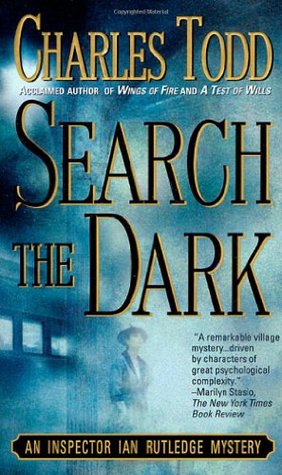 Search the Dark (Inspector Ian Rutledge, #3) by
Search the Dark (Inspector Ian Rutledge, #3) by 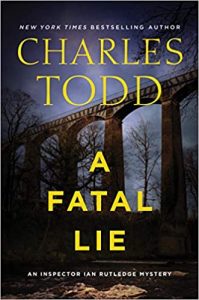 I picked this up because I was looking for a comfort read, as paradoxical as it is to find murder comfortable. Of course, I don’t find actual murder comfortable at all, but murder mysteries have to follow certain conventions – a body, a detective, a suspect, a few tasty red herrings – and I find that quite comfortable. I ended up here with Inspector Ian Rutledge because I just picked up a new book in the series (
I picked this up because I was looking for a comfort read, as paradoxical as it is to find murder comfortable. Of course, I don’t find actual murder comfortable at all, but murder mysteries have to follow certain conventions – a body, a detective, a suspect, a few tasty red herrings – and I find that quite comfortable. I ended up here with Inspector Ian Rutledge because I just picked up a new book in the series ( But what makes this series work is the dogged and tormented character of Inspector Ian Rutledge. He’s often caught between knowing that he’s right and fearing that he’s wrong. He’s afraid at every turn that he’ll fail, and that the result of that failure will condemn both an innocent and himself. He carries the seeds of his own destruction within himself, scared that others will see and judge him the less for them while knowing that they do. And yet, he can’t stop from trying, with every case, to reach for what is right. Even in a case like this one, where in the end his success has as many victims as his failure would have.
But what makes this series work is the dogged and tormented character of Inspector Ian Rutledge. He’s often caught between knowing that he’s right and fearing that he’s wrong. He’s afraid at every turn that he’ll fail, and that the result of that failure will condemn both an innocent and himself. He carries the seeds of his own destruction within himself, scared that others will see and judge him the less for them while knowing that they do. And yet, he can’t stop from trying, with every case, to reach for what is right. Even in a case like this one, where in the end his success has as many victims as his failure would have.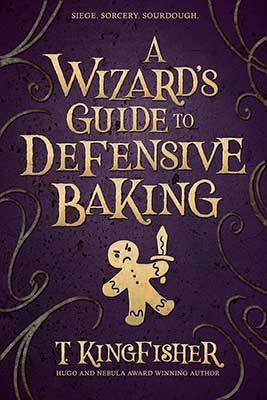 A Wizard’s Guide to Defensive Baking by
A Wizard’s Guide to Defensive Baking by  Hearts and Stones: Stories of Celta (Celta HeartMates) by
Hearts and Stones: Stories of Celta (Celta HeartMates) by 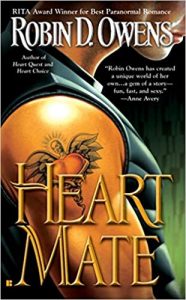 The two stories that stand out in this regard are Homing Stone and Fractured Stone, as they serve as bookends on the life of Holm Holly, a character who appears multiple times through the course of the series.
The two stories that stand out in this regard are Homing Stone and Fractured Stone, as they serve as bookends on the life of Holm Holly, a character who appears multiple times through the course of the series.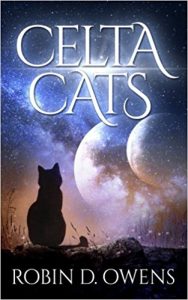 Last, but not least – if only because Zanth would NEVER allow himself to be the least of anything, there’s Stone in Zanth’s Paw. One of the loveliest things about Celta are its Fams, the psychically powerful familiar companion animals that provide so much of the heart – and comic relief – that imbues this series. Zanth is the FamCat of Rand Ash, the Fam of all Fams of the entire series. He’s also a great, big, egotistical cat who will remind catservants that as much as we wish we understood what our cats are trying to tell us that it would not be an unmitigated blessing. Zanth is not merely every bit as demanding as any cat you’ve ever met, he’s capable of expounding upon his demands and his rights and his status and his deserved privileges at every opportunity.
Last, but not least – if only because Zanth would NEVER allow himself to be the least of anything, there’s Stone in Zanth’s Paw. One of the loveliest things about Celta are its Fams, the psychically powerful familiar companion animals that provide so much of the heart – and comic relief – that imbues this series. Zanth is the FamCat of Rand Ash, the Fam of all Fams of the entire series. He’s also a great, big, egotistical cat who will remind catservants that as much as we wish we understood what our cats are trying to tell us that it would not be an unmitigated blessing. Zanth is not merely every bit as demanding as any cat you’ve ever met, he’s capable of expounding upon his demands and his rights and his status and his deserved privileges at every opportunity.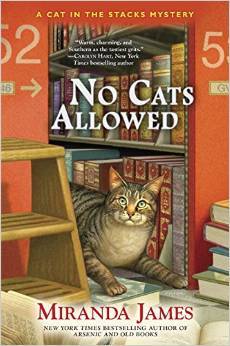 No Cats Allowed (Cat in the Stacks, #7) by
No Cats Allowed (Cat in the Stacks, #7) by  Unlike some other felines in cozies, Diesel is just a cat. A very big cat, and an extremely well-behaved cat, but definitely a cat. (Diesel weights 36 pounds, approximately the weight of all four of our cats combined!) He’s a comfort – and a comfortable – animal. And in spite of being very chatty, as cats can sometimes be, he doesn’t speak in English. Not that he can’t make himself perfectly understood by his human, but that’s a talent that all cats have. Cat owners will love using
Unlike some other felines in cozies, Diesel is just a cat. A very big cat, and an extremely well-behaved cat, but definitely a cat. (Diesel weights 36 pounds, approximately the weight of all four of our cats combined!) He’s a comfort – and a comfortable – animal. And in spite of being very chatty, as cats can sometimes be, he doesn’t speak in English. Not that he can’t make himself perfectly understood by his human, but that’s a talent that all cats have. Cat owners will love using 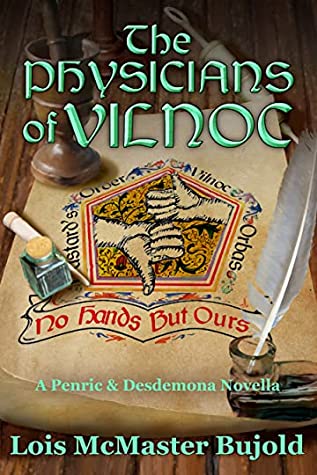 The Physicians of Vilnoc (Penric and Desdemona #9) by Lois McMaster Bujold by
The Physicians of Vilnoc (Penric and Desdemona #9) by Lois McMaster Bujold by 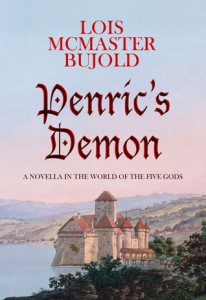 I have been haunting Amazon waiting for this book to finally be available for preorder. I didn’t expect it to just become available, period, but it did. And I couldn’t resist diving into it immediately!
I have been haunting Amazon waiting for this book to finally be available for preorder. I didn’t expect it to just become available, period, but it did. And I couldn’t resist diving into it immediately!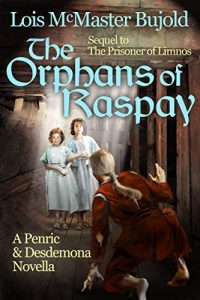 Escape Rating A: I love this series, and have from the very first book,
Escape Rating A: I love this series, and have from the very first book, 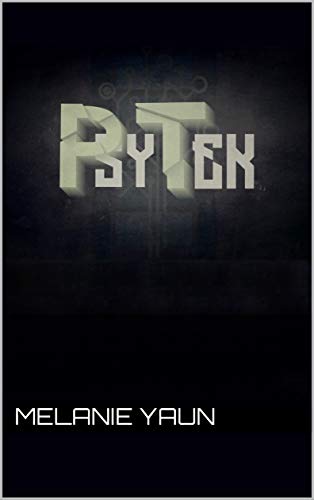 PsyTek by
PsyTek by